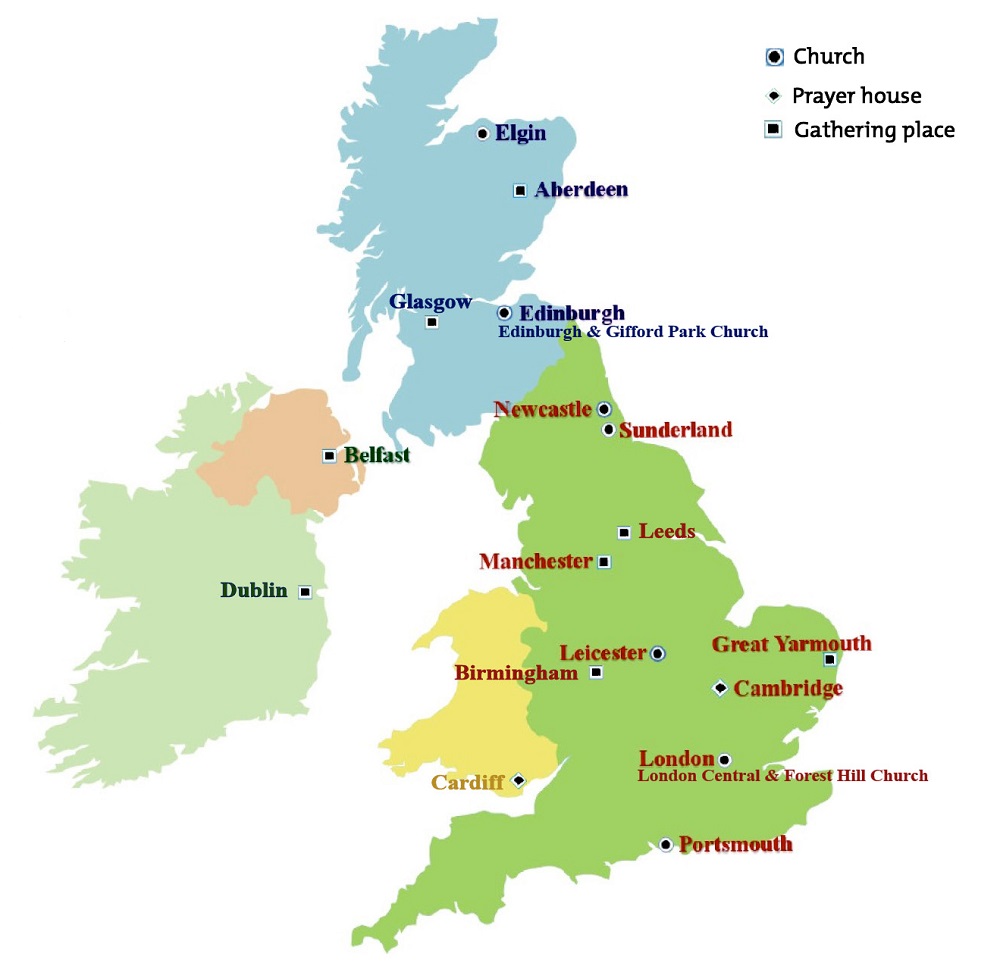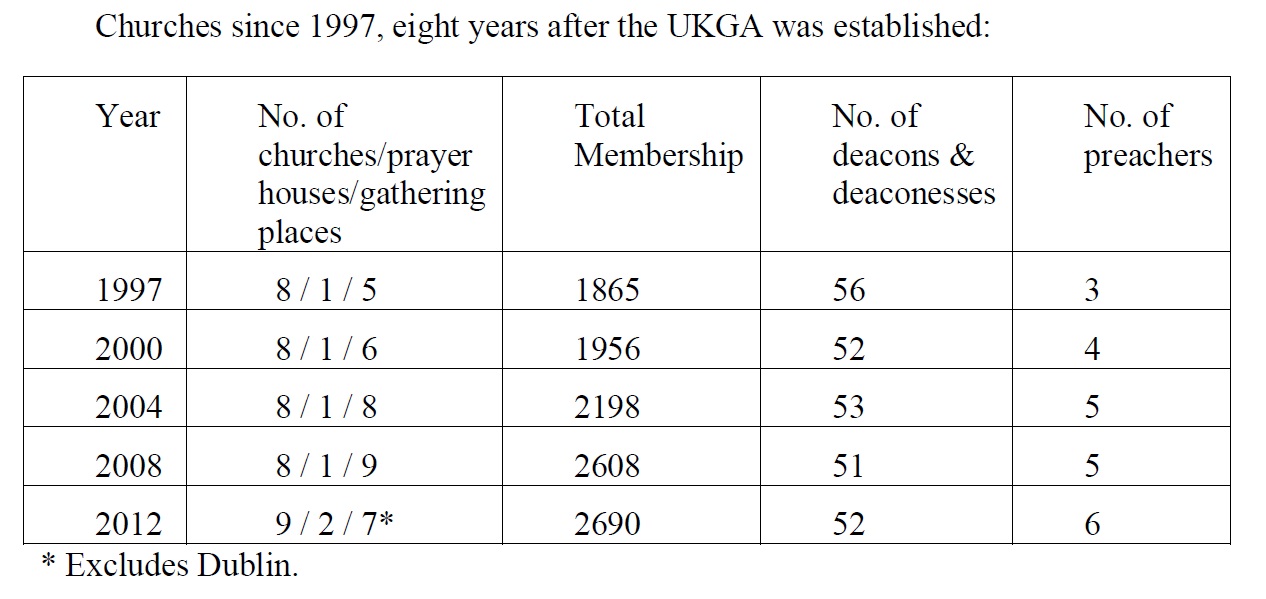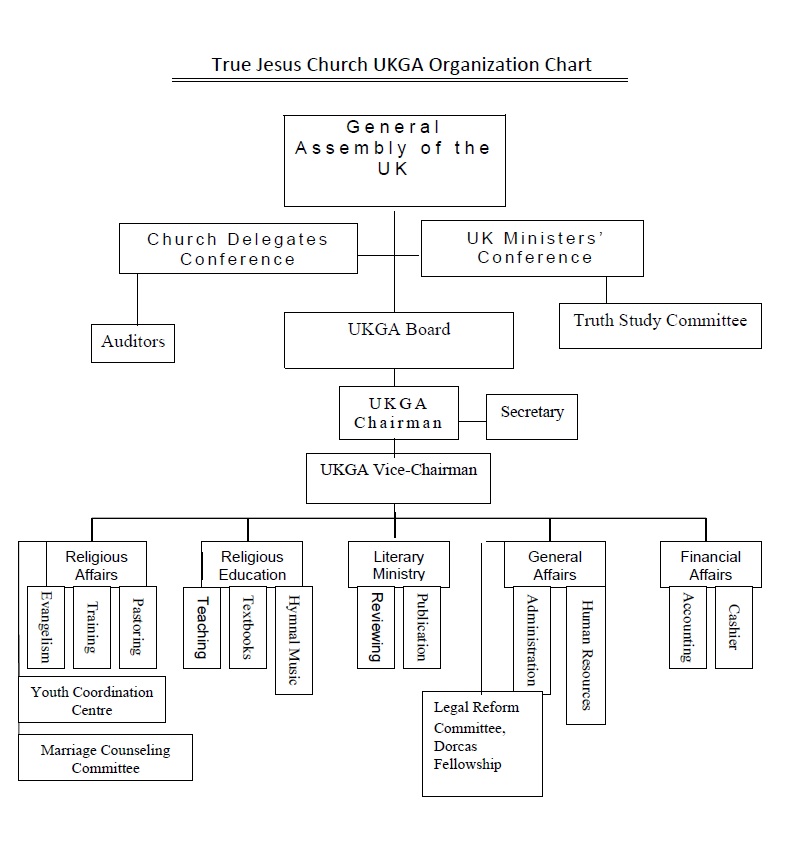History
Believers who are unaffiliated
with a church and unable to have fellowship with other brethren are like
branches that cannot bear fruit. This was the situation for the first few
isolated members and families who came to the United Kingdom (UK). Gradually,
these brethren grew in faith and fervency, and eventually established the UK
churches and the General Assembly of the United Kingdom (UKGA), but the road to
this point of development was long and hard.
True Jesus Church members from
Malaysia first migrated to the UK for study and work in 1950. Starting from
January 1960, members from Hong Kong Island, the New Territories and Ap Chau
followed. Initially, the majority of these migrants were single brothers, who
worked extremely hard for a living. They were scattered in different places and
did not gather together at first, but through the encouragement of some early
workers from overseas, the brethren gradually came together for worship.
Gathering places, prayer houses, and eventually churches were established.
Today, there are nine churches and over two thousand members spread across the
UK.
The early
years
While they were working or
studying in the UK, members continued to uphold their faith by gathering in their
own homes. In London, the brethren were few in number, yet they continued to
meet at several different locations for Sabbath services over the years. Venues
of worship during the sixties and seventies included Plaistow (1966), Chiswick
(1970), Bounds Green (1972), and Holloway (1975).
In the north of the UK, where many
Ap Chau members resided, Sabbath services were infrequent in the early 1970s.
In 1972, Brother Shi-Hung Hsiao (Deacon Roung-Kuang Hsiao) of Taiwan, then a
student in Germany, was invited by the International Assembly (IA) to join
Brother Keith Horn (an Englishman baptized in Taiwan) in visiting the UK
members before returning to Taiwan. At Newcastle, they discussed the importance
of observing the Sabbath, the issues of selecting suitable leaders, worshipping
venues and so on. Particular emphasis was placed upon the importance of Sabbath
worship. Subsequently, a service, led by Deacon Paul Tang, was held for the
first time in a member’s restaurant and was attended by more than fifty believers.
Gatherings were typically held at
members’ takeaways and restaurants. For example, in Sunderland, initial
gatherings took place in Brother Kai Pou Liu’s restaurant. In London, services
were held on the first floor of the “Tin Tin Restaurant” in Chinatown from 1976
onwards. Starting from 1975, regular Sabbath services were also held in
Leicester at the takeaway shop of a brother. And near Portsmouth, the first
Sabbath service was held at a brother’s restaurant in Bognor Regis in 1977.
The
formative years
As membership gradually increased,
the constraints and difficulties associated with holding family services began.
In Sunderland, holding classes in a takeaway shop caused complaints from the
neighbors and prompted investigations by the police. As a result, the venue had
to be moved repeatedly. In Sunderland and Leicester, hired halls were used for
services and Religious Education (RE) classes, whereas in Newcastle, members
had to rent the premises of the Central Methodist Church.
Membership in the various
locations grew and prayer churches were set up in the early 1970s. With forty
members, the Sunderland prayer house was established in 1972. In the same year,
the Cambridge prayer house was formed, followed by the Newcastle prayer house
with two hundred members in 1973. Prayer houses were further established in
Edinburgh in 1976 and Portsmouth and Leicester in 1978.
Initially, services were
rudimentary in form. For example, because of a lack of service leaders in
Edinburgh, services simply consisted of hymn-singing, prayer and Bible-reading.
As the membership increased and the members became more mature in their faith,
the responsibilities of the prayer house extended to members in neighboring
towns, such as Dundee, Prestwick, and Elgin. Members visited one another and
helped to lead family services.
In August 1975, Deacon Cephas Yau
from Hong Kong visited the members in the UK and helped with the pastoral work
in Newcastle, Sunderland, and Edinburgh. Although there were as many as seven
hundred members living in the UK at the time, they did not own a church
building. Following Deacon Yau’s continuous reminders to take action to acquire
a church building, the first True Jesus Church in the UK was dedicated to the
Lord in Newcastle on July 12, 1976. This was also the first true church
established in Europe, and the name of the Lord was greatly exalted. Sunderland
and Edinburgh followed suit in July 1979, London in 1983, Leicester in 1984,
Elgin in 1985, and Portsmouth in 1989.
As the churches grew and prayer houses
turned into churches, members became increasingly zealous in participating in
divine work. For example, Leicester Church bought a place of worship in
Peterborough, a city in a neighboring region, to ensure regular services could
take place in the area. As the number of members increased, many churches
either moved or extended their existing buildings. For example, Sunderland
Church relocated and expanded its premises in 1982 and 1994, respectively. A
constant stream of members from other parts of the world increased the number
of members in London to 175 in 1992; therefore, the church moved to a nearby
five-storey building at Old Street in 1996. In 1994, Edinburgh Church decided
to branch out; the new church, which comprised about 250 members, kept the name
of Edinburgh Church, while the former church, which had a membership of 180,
was renamed Gifford Park Church. Similarly, London Church decided to establish
a church in South London. After eight years, four moves, and three unsuccessful
bids for church properties, Forest Hill Church in South London was finally
established in 2012. In addition to this, a four-storey building for Leicester
Church was dedicated in July 2013.
Thanks to the recent influx of
members from mainland China, we now have many gathering places in the UK,
including those in Glasgow, Birmingham, Manchester and Leeds. In Cardiff, which
also started out as a gathering place, membership grew and a prayer house was
thus established in 2011.
Pastoring
Work Prior to the Establishment of the UKGA
In July 1977, the IA sent Deacon
Simon Hsu to the UK for six months of practical training. At the time, youths
who had previously participated in the RE work in Hong Kong’s Kowloon Church
also assisted in the divine work. Under the guidance of God, each UK church
made plans for further advancement, and a national conference for ministers and
church board members was held in Newcastle that same year. A resolution to
request that the IA send a preacher to assist in the divine work in the UK was
reached. Thank God, as a result, Deacon Hsu was dispatched to pastor the UK
churches for one year. In November 1983, in light of the need for a resident
preacher for the Newcastle and Sunderland churches, Preacher Aun-Quek Chin was
invited by these two churches to help out with the pastoral work.
General
Assembly of the United Kingdom
On October 24, 1989, a National
Church Delegates Conference was held at Newcastle Church. Its main purpose was
to discuss the establishment of a General Assembly (GA). After the delegates
had voted in favor of the proposal, thirteen members were elected to serve on
the General Assembly board. A committee responsible for drafting the by-laws,
rules, and regulations was also elected. Following lengthy discussions by the
first GA board, a formal set of rules and regulations was adopted for all the
UK churches.
In the beginning, UKGA workers
focused on encouraging the middle-aged members to return to the Lord. At the
same time, they tried to give care and guidance to the younger generation. The
Youth Theological Training Course (YTTC) was set up in July 1991 to train and
prepare potential workers for future church development. In addition, the Youth
Coordination Centre was established in 1992, and a full-time preacher was
assigned to care for the UK youths.

In 2003, the UKGA enhanced the
care of members’ families and the counseling of married couples by emphasizing
the importance of family life and practical faith. Since 2011, the UKGA has
been reminding the
UK members to turn their hearts back to God so that they
will not follow the trends of the world and drift away from their faith.
The number of full-time preachers
in the UK has increased from three in 1997 to six in 2012. However, we are
still short of manpower because of the heavy workload in the pioneering areas,
both in the UK and abroad. Most of the time and energy of our preachers is
spent on either evangelistic or training work, leaving very little time for
pastoral work. The care of the local churches has been left to their church
board members, with IA workers providing some assistance.
As of December 2012, a total of
nine churches and two prayer houses have been established in the UK, with a
total membership of 2,690. There are currently thirty-four deacons, eighteen
deaconesses and six preachers. May the almighty and merciful Lord continue to
guide and support us.

Current
challenges and developments
The slow growth of the UK
membership may be due to the fact that most modern families living in the West
nowadays opt to raise at most one or two children. In addition, the church has
always encouraged members to preach and spread the gospel; however, as a result
of the older generation’s limited ability to communicate in English and a
general lack of understanding of the Bible amongst the brethren, it has been
difficult to preach to non-Chinese people. Efforts towards this end need to be
strengthened with the help of our Lord. Our children and youths are the future
of the church, so we hope the next generation will be able to do a better job
than we have. Thank God, many UK youths have had the opportunity to experience
work in pioneering areas and have realized its value because of
volunteer-training seminars, particularly the Africa Voluntary Workers
Missionary Training (AVWMT).
The UK membership has increased
markedly since 2004, when many brethren began to migrate to the UK from Fujian,
China. While the increasing number of brethren from China has helped the growth
of the church in many ways, it has made pastoral work more difficult, as many
of the Chinese brethren have no fixed abode and are often scattered around the
country, receiving no support from local churches. The establishment of a
coordinating committee has improved communication and coordination among these
Chinese brethren. We continue to encourage them to establish places of worship
to facilitate regular services and fellowships. The goal would be to develop
these places of worship into prayer houses. For example, Sabbath services
amongst a small number of believers started in Cardiff in 2007, with workers
from other churches assisting in the pastoral, training, and evangelistic work.
We thank the Lord that the membership grew and a prayer house with fifty-five
members was established in 2011.
Another challenge that the UK
churches are facing is a shortage of workers. The increase in the number of
gathering places such as those in Manchester, Birmingham, Belfast and Dublin
has led to a greater need for speakers, interpreters, and RE teachers.
Additionally, the UKGA is responsible for the African ministry and the pastoral
work in many European countries, which require the involvement of many workers.
In order to meet these challenges, the UKGA has encouraged retired and gifted
brethren, ministers, and YTTC graduates to participate in church work. In
addition, more training opportunities have been established: the duration of
the YTTC has been increased from three to four years, and in 2011, an annual
adult theological training course was introduced. These take place in addition
to the annual AVMT and regular pastoral training for church workers.
Through the grace and guidance of
God, following the efforts of the UKGA and all the UK churches, the members in
the UK are gradually being transformed and strengthened in their faith. May all
glory and praise be given to God!



